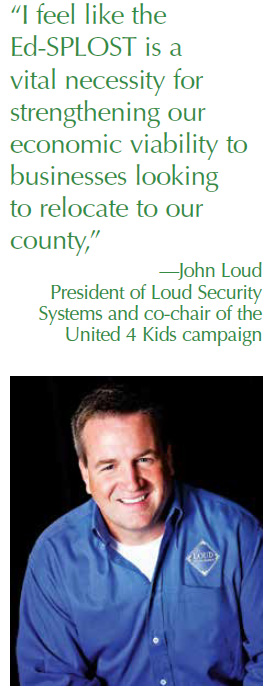
On March 19, a small group of Cobb County citizens came together to support public education through the continuation of a longstanding 1-cent special sales tax. With just 40,565 voters turning out, the fourth incarnation of the Ed-SPLOST, which funds capital improvements to Cobb County and Marietta City schools, was approved 23,248 to 17,317.
Though the special election garnered a less than 10 percent turnout, supporters of the tax cite the 57 percent majority as a clear victory for the county’s schools. “This vote was huge,” says Dr. Michael Hinojosa, superintendent of the Cobb County School District. “It’s really important that the community stepped up to support sorely needed school funding. We’re really proud of the community.”
Cobb’s Education Landscape
A popular way to raise funds for county improvement projects, Cobb County voters have continually voted for SPLOST projects for local roads and city parks. Last summer’s region-wide transportation SPLOST was resoundingly rejected by Cobb voters, but SPLOSTs remain a popular way to improve infrastructure. Since the 1-cent sales tax is tacked onto every purchase within the county limits, the yearly cost can be anywhere from $500 to $1,000 per individual, and more than $3,000 for a family of four.
Since 1998, three previous incarnations of the Ed-SPLOST have facilitated more than 5,000 projects, including the construction of 22 new schools, 2,372 classrooms, hundreds of maintenance improvements, safety and technology improvements, 46,000 new computers and the elimination of more than 500 portable classroom trailers.
“In the early years of the Ed-SPLOST we replaced a lot of trailers and built a lot of new classrooms because the growth curve was so tremendous,” says JoEllen Smith, an education advocate and active member of the pro-SPLOST group FACE It Cobb. “But now that the growth has slowed down, the buildings are starting to age, the roofs are leaking and the plumbing needs to be updated.”
The Funding Crisis
Though the Cobb County School District is debt free, the state’s general fund, which supplies much-needed tax dollars to the state’s counties, is operating at an $80 million deficit for the county. This grim statistic means that 90 percent of the general fund goes to pay the salaries of teachers, administrators, bus drivers, food service employees and custodians. The other 10 percent goes to textbooks, school supplies and utilities, leaving nothing left over to pay for capital improvements.
Adding to the stress of the general fund deficit, the county is further hampered by the fact that Cobb exempts homeowners who are 62 and older from paying school property taxes. The county’s funding woes are further exacerbated by the fact that 32 percent of Cobb County’s schools are more than 40 years old. Smith, whose daughter attends a public school in Cobb, says that the school experiences standing water in the hallways every time it rains. “When you’re going to a school that has mold because the roof is leaking,” she says, “that is not an environment that is conducive to learning.”
Since capital investment in the county’s schools is urgently needed, the alternative to a SPLOST is to issue a bond that would raise county property taxes, putting additional burdens on homeowners who are already paying one the highest school millage rates in the metro area. SPLOST supporters also point out that a $225 million bond that was issued in 1995 for school construction resulted in an additional $95 million in interest.
“When I was a superintendent in Dallas we had to issue a $1.2 billion bond that had to be paid back over 25 years on the backs of homeowners,” says Hinojosa, who notes that Cobb County is one of the largest school districts in country that has the distinction of being debt free. “The SPLOST is a less expensive, pay-as-you-go way of financing education that is unique to Georgia.”
In addition to being an interest- and debt-free way of paying for public education, the Ed-SPLOST shifts the tax burden away from homeowners and onto consumers. This innovation means that non-residents who enter the county for work, play or travel will foot as much as 30 percent of the bill for the county. “SPLOST is a more equitable way to raise funds,” says John Loud, president of Loud Security Systems and co-chair of the United 4 Kids campaign, a 501(c)(4) organization that lobbied and raised awareness for the passage of the Ed-SPLOST. “Even if a homeowner owns a $250,000 home, chances are they don’t have an extra $77,000 of taxable income on the table to pay for a bond. This way, more than a third of the funds will be raised by those who don’t live in Cobb County.”
Inside SPLOST
Although school officials initially identified $2 billion of need, the final Ed-SPLOST project notebook came in at $717.8 million for Cobb County and $55.4 million for Marietta City. The budget includes nearly $160 million for the district’s most ambitious projects—replacing Osborne and Walton high schools, an East Cobb middle school and two yet-to-be-determined elementary schools, as well as constructing a state-of-the-art career academy catering to students with technical aptitudes.
In addition to addressing overcrowding at Walton, one of the top public schools in the nation, major additions, modifications and renovations will occur at Campbell, Harrison, Lassiter, North Cobb, Pope, South Cobb and Wheeler high schools, as well as Tapp Middle School and numerous elementary schools.
The $55.4 million budgeted for Marietta City Schools includes $15.2 million to pay off debt, $16 million in technology upgrades, $2 million for transportation and $20 million toward construction, renovations and equipment for Marietta Middle, Marietta City High School and many elementary schools.
Maintenance, renovation and safety projects will grace every school in the county, resulting in new data centers, server and computer upgrades, controlled access equipment, surveillance cameras, security fencing, additional parking spaces, landscaping, new playground equipment and athletic field improvements. Such improvements are welcome news for parents like Smith, who says that a new gymnasium floor at her daughter’s school was paid for with funds raised by the parents themselves.
 SPLOST Supporters
SPLOST Supporters
“I feel like the Ed-SPLOST is a vital necessity for strengthening our economic viability to businesses looking to relocate to our county,” says Loud, who believes schools are a major reason why Cobb is perennially popular with Fortune 500 companies looking to relocate. “If there is a strong education system with good schools, businesses will continue to want to come here.” Loud also commends the idea of a career academy designed to funnel talented students into fast-growing technical careers that can’t be outsourced. “It’s important to open up every possibility for our children,” he says. “Gov. Deal highlighted technical careers as one of the most important new areas of curriculum to develop, and the career academy may help more nontraditional students stay in school and find better paying jobs when they graduate.”
With nearly 15,000 employees, the Cobb County and Marietta City school systems are two of the biggest employers in the county. Supporters of the Ed-SPLOST say that the tax prevents the state from having to lay off teachers by diverting much-needed salary funds to pay for capital improvements. Such a move would increase student class sizes and deal a devastating blow in an already tough economy.
SPLOST Detractors
Much of the criticism and lobbying efforts against the Ed-SPLOST revolved around the anti-tax leadership of the Georgia Tea Party, who branded their opposition with the slogan, “Ax the Tax.” The conservative group took aim at the Ed-SPLOST project notebook, which they believe includes projects designed to spend the maximum number of tax dollars for the maximum number of years. “The project list is flawed and wasteful, and only a third of it is focused on actual education,” says Tom Maloy, a 40-year Cobb resident and board member of the Georgia Tea Party. “They are focused on building opulent gymnasiums and theaters. Seven schools need $112 million to build gyms and theaters? These price tags seem off-kilter with reality.”
 SPLOST opponents also cite ambiguities in the project notebook. School officials have yet to make any concrete decisions about where the $30 million career academy will be built, how it will be staffed and how students will get there, and Tea Party advocates question why the district has yet to name the two elementary schools that will be replaced. “If the needs were that dire, surely they would be identified in the notebook,” says Maloy. “I think they failed to mention the names because they wanted voters to feel like their school might be replaced.”
SPLOST opponents also cite ambiguities in the project notebook. School officials have yet to make any concrete decisions about where the $30 million career academy will be built, how it will be staffed and how students will get there, and Tea Party advocates question why the district has yet to name the two elementary schools that will be replaced. “If the needs were that dire, surely they would be identified in the notebook,” says Maloy. “I think they failed to mention the names because they wanted voters to feel like their school might be replaced.”
Critics also note that though the tax will create dozens of new classrooms and state-of-the-art facilities, there is no money earmarked to heat, light or staff new facilities. Supporters of the Ed-SPLOST say this argument is unfair because SPLOST money can only be allocated for capital improvements. “We are forced to do these SPLOSTs because money from the general fund goes to pay salaries,” says Smith. “Legally, we are not allowed to pay for teachers with SPLOST money. I wish we had that flexibility but we don’t. To lay off teachers and expand class sizes to make capital improvements is not the right direction to go.”
With no money to provide utilities and staff for new facilities like the proposed 95,000-square-foot career academy, critics of the Ed-SPLOST say their worst fear would be double taxation—continued SPLOST funding supplemented by a property tax-supported bond. “There’s not enough money in the general fund to pay for maintaining and staffing the buildings they already have, we don’t want to be building new stuff that will only compound the $80 million deficit,” says Maloy. “I would be more attracted to spending several million dollars in interest on projects we really need rather than wasting money like this.”
The SPLOST Fight
In the weeks leading up to the March 19 vote, parent-supported PTAs and grassroots awareness groups like FACE It Cobb were bolstered by the efforts of United 4 Kids. Raising awareness through community websites, opinion pieces, yard signs, radio ads, local business associations and PTAs, in early March the campaign culminated in 4,000 TV commercials, six billboards and 75,000 robocalls. “The notion that no one knew about this vote is absurd,” says Loud. “It’s about being tuned in to your community. The conversation started months ago and the $2 billion project list was pared down to $773 million through community input.”
Opponents assert that $300,000 in public money was spent to hold a springtime special election that favored low turnout and the passage of the Ed-SPLOST. “This was not a normal voting time and they knew only people with a special interest would come out and vote,” says Maloy. “The school districts had quite a bit of latitude to determine when the vote would be held. I think they didn’t want to create a gap in revenue between the SPLOSTs because people might start to enjoy not paying that extra penny.”

School officials say the necessity of the March vote had to do with the project backlog a funding gap would create. “The biggest issue out of the gate is looking at the needs and which projects should start immediately in 2014,” says Hinojosa. “Without the March vote, there would not be a continuous stream of funding and there would be a lapse in revenue, which would put current projects in jeopardy and prevent us from doing essential construction work this summer and next summer, which is when the bulk of renovations occur.”
Though vocal SPLOST critics like the Cobb County Taxpayers Association are promising to build up grassroots support to change the rules about how and when special elections are held in 2018, Smith says voters had six ways to vote early. “I’m never happy when people don’t exercise their right to vote, but the turnout indicated that both sides were informed and active on the issue,” she says. “With this special election, there was early voting and absentee voting, so citizens had plenty of opportunities to voice their opinion in the weeks before March 19.”
SPLOST Oversight
The Ed-SPLOST’s $773 million in funding will be supervised by a citizen’s oversight committee operating in a similar capacity to the panel that oversees roads and recreation funding for Cobb County government. Appointed by the Board of Education, the independent panel of local business leaders is known as the Facilities & Technology Review Committee. In addition to the supervision of a full-time Ed-SPLOST executive director, the oversight group meets on a monthly basis to review all the bids and verify that the Ed-SPLOST program is operating efficiently and maximizing taxpayer dollars. The group’s meetings are open to the public and the minutes are recorded by a board liaison who posts them to the school district’s website.
 “It’s very important to have a group that ensures that expenditures meet the standards and that SPLOST money is used exactly as it was intended in the notebook,” says Chris Ragsdale, deputy superintendent of operational support. “The budgets in the notebook are estimates, so for projects that are nearly five years away, sometimes it’s hard to predict whether something will be over or under budget.” Ragsdale is quick to mention that many of the SPLOST III projects arrived under budget due to the soft economy. “When you’re approving projects, you want the notebook to be as accurate as possible because if costs come out significantly higher than expected, you will lose the ability to finish other projects,” he adds. “Once the $717 million is spent, it’s over and no more money can be allocated.”
“It’s very important to have a group that ensures that expenditures meet the standards and that SPLOST money is used exactly as it was intended in the notebook,” says Chris Ragsdale, deputy superintendent of operational support. “The budgets in the notebook are estimates, so for projects that are nearly five years away, sometimes it’s hard to predict whether something will be over or under budget.” Ragsdale is quick to mention that many of the SPLOST III projects arrived under budget due to the soft economy. “When you’re approving projects, you want the notebook to be as accurate as possible because if costs come out significantly higher than expected, you will lose the ability to finish other projects,” he adds. “Once the $717 million is spent, it’s over and no more money can be allocated.”
Though the Ed-SPLOST oversight structures are welcome news for many, critics contend that there is too much leeway in the way funds are allocated. “A review board will help with the accountability of this thing, but it’s still unclear what they’ll be accountable for,” says Maloy. “The notebook is so vague, the board will have a rough time saying the school board isn’t doing what they said they would to do.”
Ed-SPLOST supporters discount the critics, citing the sheer volume of information listed in the Ed-SPLOST notebook. “The notebook is not lacking in detail or depth, and there is a committee who oversees every dollar spent,” says Loud. “During SPLOST II the projects were completed with $80 million left over, so the remaining money was used to pay off the system’s debt, which rolled back millage rates and lowered the tax burden for Cobb homeowners.”
As an additional taxpayer safeguard, an outside firm conducts an annual performance audit of the Ed-SPLOST program, posting the results directly on the district’s website. In January 2013, the Cobb County School District earned an A+ rating for transparency from Sunshine Review, a citizen-run, national non-profit organization that has evaluated more than 6,000 state and local government websites. According to the report, Cobb County schools met all 10 of the organization’s standards for accountability, making it one of only two Georgia public school systems to earn an A+ rating for openness.
The Future of Education in Cobb
As one of the highest-rated and highest-achieving school systems in the state, many education advocates see the Ed-SPLOST system as a way to maintain the district’s reputation for superior learning. “Not every project is perfect, but we can’t let the perfect be the enemy of the good,” says Smith. “The Ed-SPLOST funds will relieve stress on the general budget so we can keep paying for our teachers, [who] are the most important link in the educational chain.”
Since SPLOST began in 1998, student enrollment in Cobb County has jumped from 60,000 students to more than 116,000. “I applaud a community like Cobb for stepping up to meet the needs and growth of our student population,” says Loud, who believes Cobb voters may be able to raise future capital through less costly innovations like a partial penny sales tax. “At the end of the day, this is about our kids and our economic development. If we put our children first, we are a shining example and companies will continue to want to come and explore the possibilities in Cobb County for that very reason.” Like Loud, many residents view the vote as an economic affirmation, since strong schools often correlate with higher property values.
Though Maloy remains a staunch critic of the Ed-SPLOST, he has the highest respect for the quality education his grandchildren are receiving. “Cobb County schools are some of the best in Georgia,” he says. “It’s a good system and they are doing a lot of things right, but the future is being clouded by this SPLOST. The tax increase to fix the general fund is going to have to come from somewhere and it’s worse now that this Ed-SPLOST has passed. This tax is not going to help one bit or change the quality of education for students.”
For Hinojosa, who faces education’s challenges every day, a far rosier picture emerges as he imagines the school-by-school impact the Ed-SPLOST will have on students. “Cobb County Schools are really the best in class for the whole child, and the new classroom spaces will support the curriculum and keep kids engaged in school longer,” he says. “We need teachers and textbooks, but we also need buses and buildings, and every operating dollar will indirectly impact students and teachers. When you look at what Cobb has accomplished in the past through high-quality education, and with the hope and aspirations of this renewed five-year commitment, I believe we are on our way to becoming one of the top 10 large school districts in the country.”














 SPLOST Supporters
SPLOST Supporters SPLOST opponents also cite ambiguities in the project notebook. School officials have yet to make any concrete decisions about where the $30 million career academy will be built, how it will be staffed and how students will get there, and Tea Party advocates question why the district has yet to name the two elementary schools that will be replaced. “If the needs were that dire, surely they would be identified in the notebook,” says Maloy. “I think they failed to mention the names because they wanted voters to feel like their school might be replaced.”
SPLOST opponents also cite ambiguities in the project notebook. School officials have yet to make any concrete decisions about where the $30 million career academy will be built, how it will be staffed and how students will get there, and Tea Party advocates question why the district has yet to name the two elementary schools that will be replaced. “If the needs were that dire, surely they would be identified in the notebook,” says Maloy. “I think they failed to mention the names because they wanted voters to feel like their school might be replaced.”
 “It’s very important to have a group that ensures that expenditures meet the standards and that SPLOST money is used exactly as it was intended in the notebook,” says Chris Ragsdale, deputy superintendent of operational support. “The budgets in the notebook are estimates, so for projects that are nearly five years away, sometimes it’s hard to predict whether something will be over or under budget.” Ragsdale is quick to mention that many of the SPLOST III projects arrived under budget due to the soft economy. “When you’re approving projects, you want the notebook to be as accurate as possible because if costs come out significantly higher than expected, you will lose the ability to finish other projects,” he adds. “Once the $717 million is spent, it’s over and no more money can be allocated.”
“It’s very important to have a group that ensures that expenditures meet the standards and that SPLOST money is used exactly as it was intended in the notebook,” says Chris Ragsdale, deputy superintendent of operational support. “The budgets in the notebook are estimates, so for projects that are nearly five years away, sometimes it’s hard to predict whether something will be over or under budget.” Ragsdale is quick to mention that many of the SPLOST III projects arrived under budget due to the soft economy. “When you’re approving projects, you want the notebook to be as accurate as possible because if costs come out significantly higher than expected, you will lose the ability to finish other projects,” he adds. “Once the $717 million is spent, it’s over and no more money can be allocated.”
